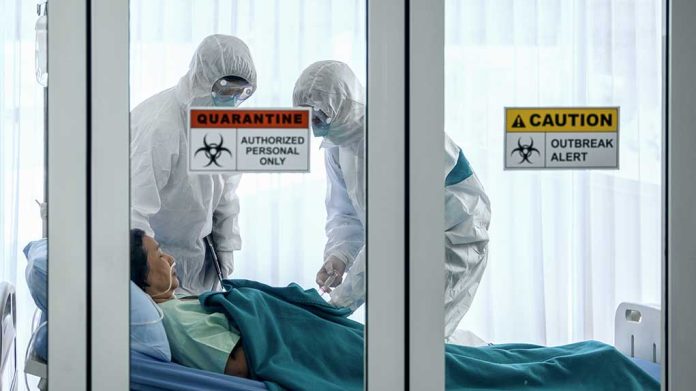
The Trump administration has slashed over $750 million in federal funding for Moderna’s mRNA-based bird flu vaccines, citing concerns about “under-tested” technology and lack of oversight during the previous administration.
Key Takeaways
- HHS under the Trump administration is terminating over $750 million in funding to Moderna for mRNA-based bird flu vaccines, citing safety and ethical concerns.
- The Biden administration previously awarded Moderna $766 million for mRNA vaccine technology that faced criticism for potential adverse side effects.
- HHS Communications Director Andrew Nixon labeled mRNA technology as “under-tested” and emphasized concerns about safety, integrity, and public trust.
- Moderna defended its bird flu vaccine’s safety profile and immune response results from early-phase trials involving about 300 healthy adults.
- The decision aligns with broader shifts in federal vaccine policy, including removing COVID-19 vaccines from recommended lists for children and pregnant women.
Trump Administration Redirects Vaccine Funding
President Trump’s Department of Health and Human Services (HHS) has terminated over $750 million in funding to Moderna for the development of mRNA-based bird flu vaccines. This decisive action represents a significant shift in vaccine policy, moving away from the previous administration’s heavy investment in mRNA technology. The Biden administration had previously awarded Moderna $590 million and an additional $176 million specifically for developing mRNA vaccine technology against potential bird flu outbreaks, investments now deemed questionable by current HHS leadership.
“After a rigorous review, we concluded that continued investment in Moderna’s H5N1 mRNA vaccine was not scientifically or ethically justifiable. This is not simply about efficacy — it’s about safety, integrity, and trust. The reality is that mRNA technology remains under-tested, and we are not going to spend taxpayer dollars repeating the mistakes of the last administration, which concealed legitimate safety concerns from the public,” Stated Andrew Nixon
Safety Concerns Drive Policy Change
The funding cuts come amid ongoing debates about the safety profile of mRNA vaccines, which became widely used during the COVID-19 pandemic through products developed by Moderna and Pfizer. These vaccines faced criticism for potential adverse side effects, particularly myocarditis in younger populations. Trump officials pointed to what they described as a lack of proper oversight during the Biden administration as a primary reason for terminating the funding, suggesting that legitimate safety concerns were downplayed or concealed from the public during the pandemic response.
A Senate Republican report supported these concerns, suggesting the Biden administration withheld critical safety data and systematically downplayed risks associated with mRNA COVID-19 vaccines. This alleged lack of transparency has fueled broader public skepticism about the technology. The decision to cut funding aligns with other recent policy changes, including the removal of COVID-19 vaccines from the recommended vaccination list for children and pregnant women, reflecting a more cautious approach to novel vaccine technologies.
Moderna Defends Its Research
Moderna has pushed back against the funding termination, highlighting what it describes as positive results from early-phase trials of its mRNA-based H5 bird flu vaccine. According to the company, these trials demonstrated both a strong immune response and favorable safety profile in approximately 300 healthy adult participants. Despite losing federal funding, Moderna’s leadership has indicated they will pursue alternative pathways to continue development of their bird flu vaccine program, maintaining that mRNA technology remains valuable for addressing emerging health threats.
“While the termination of funding from HHS adds uncertainty, we are pleased by the robust immune response and safety profile observed in this interim analysis of the Phase 1/2 study of our H5 avian flu vaccine and we will explore alternative paths forward for the program,” Stated Stephane Bancel, Chief Executive Officer of Moderna
Broader Implications for Public Health
The United States currently maintains older technology vaccines against H5 viruses in its Strategic National Stockpile, raising questions about preparedness for potential avian influenza outbreaks without newer mRNA options. Some public health experts have expressed concern that growing anti-vaccine and anti-mRNA sentiments could undermine future pandemic readiness. The H5N1 virus remains a concern due to its potential impact on humans, though the administration appears confident that existing stockpiles and conventional vaccine approaches provide adequate protection.
The Trump administration has emphasized its commitment to thoroughly evaluating mRNA research and ensuring complete transparency with the American public about vaccine safety. This approach represents a significant departure from previous policy, prioritizing cautious, well-tested approaches to vaccine development over rapid deployment of newer technologies. For conservative Americans concerned about government overreach in healthcare and rushed medical technologies, this policy shift signals a welcome return to traditional scientific standards and increased scrutiny of pharmaceutical innovations.




